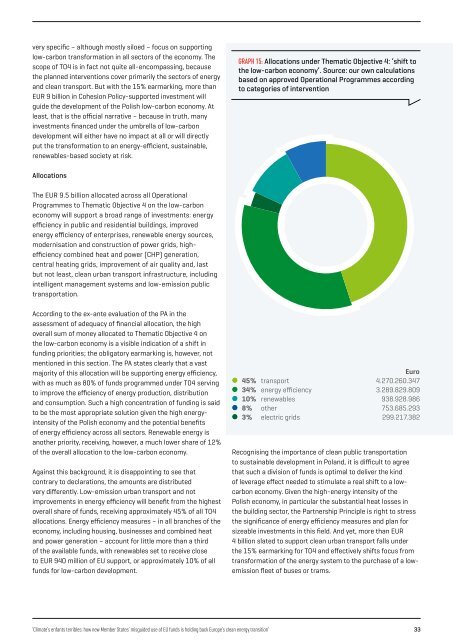ENFANTS TERRIBLES
enfants-terribles
enfants-terribles
Create successful ePaper yourself
Turn your PDF publications into a flip-book with our unique Google optimized e-Paper software.
very specific – although mostly siloed – focus on supporting<br />
low-carbon transformation in all sectors of the economy. The<br />
scope of TO4 is in fact not quite all-encompassing, because<br />
the planned interventions cover primarily the sectors of energy<br />
and clean transport. But with the 15% earmarking, more than<br />
EUR 9 billion in Cohesion Policy-supported investment will<br />
guide the development of the Polish low-carbon economy. At<br />
least, that is the official narrative – because in truth, many<br />
investments financed under the umbrella of low-carbon<br />
development will either have no impact at all or will directly<br />
put the transformation to an energy-efficient, sustainable,<br />
renewables-based society at risk.<br />
GRAPH 15: Allocations under Thematic Objective 4: ‘shift to<br />
the low-carbon economy’. Source: our own calculations<br />
based on approved Operational Programmes according<br />
to categories of intervention<br />
Allocations<br />
The EUR 9.5 billion allocated across all Operational<br />
Programmes to Thematic Objective 4 on the low-carbon<br />
economy will support a broad range of investments: energy<br />
efficiency in public and residential buildings, improved<br />
energy efficiency of enterprises, renewable energy sources,<br />
modernisation and construction of power grids, highefficiency<br />
combined heat and power (CHP) generation,<br />
central heating grids, improvement of air quality and, last<br />
but not least, clean urban transport infrastructure, including<br />
intelligent management systems and low-emission public<br />
transportation.<br />
According to the ex-ante evaluation of the PA in the<br />
assessment of adequacy of financial allocation, the high<br />
overall sum of money allocated to Thematic Objective 4 on<br />
the low-carbon economy is a visible indication of a shift in<br />
funding priorities; the obligatory earmarking is, however, not<br />
mentioned in this section. The PA states clearly that a vast<br />
majority of this allocation will be supporting energy efficiency,<br />
with as much as 80% of funds programmed under TO4 serving<br />
to improve the efficiency of energy production, distribution<br />
and consumption. Such a high concentration of funding is said<br />
to be the most appropriate solution given the high energyintensity<br />
of the Polish economy and the potential benefits<br />
of energy efficiency across all sectors. Renewable energy is<br />
another priority, receiving, however, a much lower share of 12%<br />
of the overall allocation to the low-carbon economy.<br />
Against this background, it is disappointing to see that<br />
contrary to declarations, the amounts are distributed<br />
very differently. Low-emission urban transport and not<br />
improvements in energy efficiency will benefit from the highest<br />
overall share of funds, receiving approximately 45% of all TO4<br />
allocations. Energy efficiency measures – in all branches of the<br />
economy, including housing, businesses and combined heat<br />
and power generation – account for little more than a third<br />
of the available funds, with renewables set to receive close<br />
to EUR 940 million of EU support, or approximately 10% of all<br />
funds for low-carbon development.<br />
Euro<br />
45% transport 4.270.260.347<br />
34% energy efficiency 3.289.829.809<br />
10% renewables 938.928.986<br />
8% other 753.685.293<br />
3% electric grids 299.217.382<br />
Recognising the importance of clean public transportation<br />
to sustainable development in Poland, it is difficult to agree<br />
that such a division of funds is optimal to deliver the kind<br />
of leverage effect needed to stimulate a real shift to a lowcarbon<br />
economy. Given the high-energy intensity of the<br />
Polish economy, in particular the substantial heat losses in<br />
the building sector, the Partnership Principle is right to stress<br />
the significance of energy efficiency measures and plan for<br />
sizeable investments in this field. And yet, more than EUR<br />
4 billion slated to support clean urban transport falls under<br />
the 15% earmarking for TO4 and effectively shifts focus from<br />
transformation of the energy system to the purchase of a lowemission<br />
fleet of buses or trams.<br />
‘Climate’s enfants terribles: how new Member States’ misguided use of EU funds is holding back Europe’s clean energy transition’ 33


